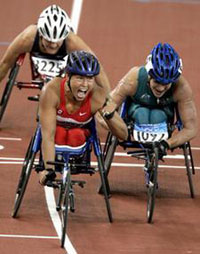A brief history of the Paralympic Games
[ 2006-11-10 11:18 ]
“喚醒思想,解放身體,鼓舞精神”——殘疾人運動會格言。
兩次世界大戰結束后,全球出現了不少殘障軍民,復健治療漸漸被重視起來,為了減少因肢體傷殘所帶來的影響,這些殘障者開始接受體能訓練,以運動幫助復健以及恢復自信。
1948年,一位為躲避納粹政府,逃難到英國的德國神經外科醫生古特曼博士為二戰中脊髓損傷的軍人組織了一次運動會,這樣,起初的康復性娛樂活動演變為后來的運動比賽,而古特曼也成為了“殘疾人運動之父”。

"Awaken the Mind, Free the Body, Inspire the Spirit."--motto of
Paralympics.
The fundamental philosophy guiding the Paralympic Movement
is that athletes with disabilities should have opportunities to pursue their
goals in sport equivalent to those of non-disabled athletes.
The
Paralympic Games represent a commitment to excellence that allows elite athletes
to achieve their personal best. The Paralympic Games exemplify the Olympic ideal
of participation and sportsmanship.
That Paralympic spirit can be traced
to 1948 when Sir Ludwig Guttmann, a German born neurosurgeon who emigrated to
England in 1939as a refugee from Nazi occupation, organized an athletic
competition in Stoke Mandeville for World War Ⅱ veterans with spinal cord
injuries. Four years earlier, at the British government's request to open Stoke
Mandeville Hospital's National Spinal Injury Center, mainly to treat wounded
servicemen, Dr. Guttmann had introduced a new rehabilitation of paralyzed
patients. What began as rehabilitative recreation evolved into athletic
competition with Guttmann emerging as "The Father of Disabled Sport".
A
new page in Paralympic history was written when, in 1988, the Paralympic Games
were held immediately following the Olympic Games in Seoul, Korea, Using the
same facilities as the Olympic Games. Since this date the Summer and Winter
Paralympic Games have followed the Olympic Games utilizing the same venues,
village and in many cases joint sponsors and organizational structures.
(Foreign and Domestic Olympic
Stories)
點擊查看更多奧運百科
|